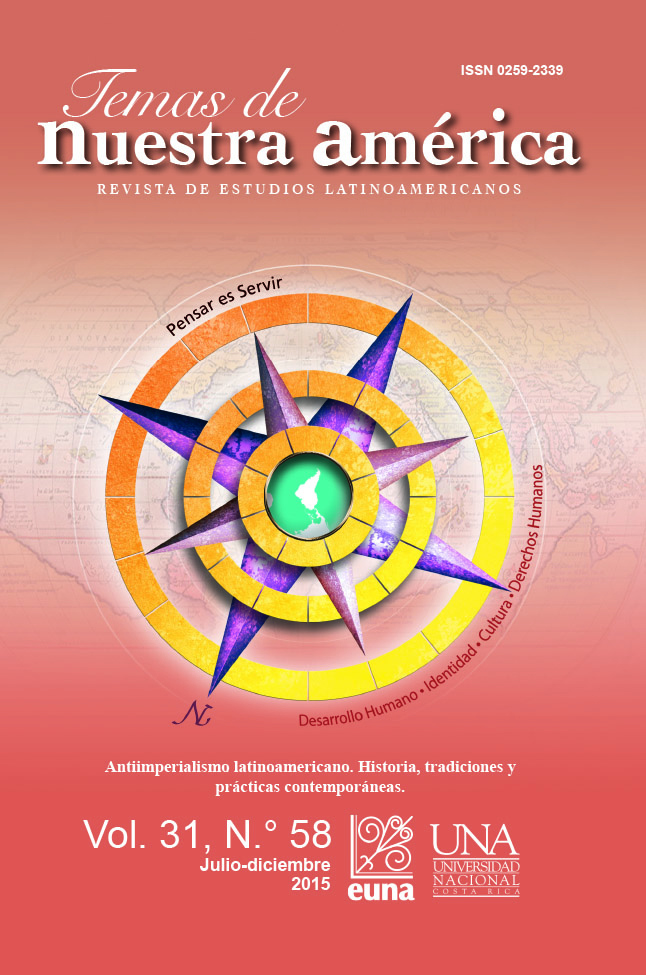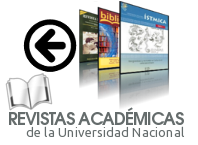Hopes and dissapoinments during the Great War: American Poets and Croniclers
DOI:
https://doi.org/10.15359/tdna.31-58.1Keywords:
World War I, José Basileo-Acuña, Rubén Darío, Salomón de la Selva, Enrique Gómez-Carrillo, Latin American Thinking, Cultural HistoryAbstract
The year 2014 witnessed a huge outcome of scholarly materials analyzing the political and historical milestone the World War I set. Contemporary historiographical approaches put culture into the perspective of the cultural turn, that is to say, a passage from the social history towards a cultural history, in this case, regarding the Big War. This paper analyzes the World War I from the point of view of four Latin American chroniclers, Costa Rican José Basileo Acuña (1897-1916), Nicaraguan Salomón de la Selva (1893-1959) and the poet, Rubén Darío (1867-1916), and the Guatemalan journalist Enrique Gómez-Carrillo (1873-1927). They eye-witnessed and experienced the confrontation at first hand. Therefore, besides giving us their personal glance of the conflict, their texts also bring us closer to the day-to-day wartime history, letting us know the story of the anonymous heroes, of the mutilated and displaced victims of war from that first conflict that affected all mankind.
References
Acuña, B. (2010). Obras completas. Peggy Von Mayer (Ed.). Costa Rica: EUCR.
Campagnom, O. (2014) América latina y la Gran Guerra. Argentina: Editorial Crítica.
Caro, D. H.(2014) La gran desilusión frente a Europa. Revista Arcadia.com. Recuperable en: www.revistaarcadia.com/impresa/periodismo/articulo/la-gran-desilución-frente-a-Europa/38053
Chen-Sham, J.(2014) Un poeta costarricense en la primera guerra mundial. La Nación Suplemento Ancora, 14 de noviembre, p. 9.
_______. (2014). La Primera Guerra Mundial y la poesía centroamericana: la contienda vista por José Basileo Acuña y Salomón de la Selva. Pensamiento actual. Universidad de Costa Rica, 13(21), p. 51-67.
Colombi, B. (2009). Una ciudad letrada extraterritorial: escritores hispanoamericanos en París en el fin – de- siglo. Recuperable en: http://www.iai.spk-berlin.de/
Darío, R. Poesía. Biblioteca Ayacucho. Recuperable en: www.bibliotecayacucho.gov. ve
de la Selva, S. (1922) El Soldado Desconocido. México: Editorial Cultura.
__________. (2005). El Soldado Desconocido y otros poemas. Selección, introducción y bibliografía Miguel Ángel Flores. Epílogo de Pedro Henríquez Ureña .México: Fondo de Cultura Económica.
Gómez Carrillo, E. (1919). Obras completas. Madrid: Editorial Mundo Latina.
___________. 2013. Mata Hari. México: Fontamara.
Junger, E. (2014). Tempestades de acero. Barcelona: TusQuest editores.
Langue, F. (2014). América Latina y la I Guerra Mundial: una historia cultural. Recuperable de: http://historia.fundacionmapfre.org/historia/es/blog/dossier-fm/tema-i-guerra-mundial.jsp.
Pérez Galdós, B. (1919). Prólogo. Campos de batalla y campos de ruinas. (Enrique Gómez Carrillo). Madrid: Editorial Mundo latino.
Prost, A. y Winter, J. (2013) Penser la Grande Guerre. Un essai d'histoiriographie. En: La Gran guerra de los intelectuales. Maximiliano Fuentes Cadera (Comp.). España en Europa. Ayer 1, p. 2.
Quesada, R. (2014). Enrique Gómez Carrillo (1873-1921) Cronista de la primera Guerra mundial. Revista Escáner Cultural, n 171, Marzo.
_______________(2014). Imperialismo y barbarie: la primera Guerra mundial y el asesinato de Rosa Luxemburgo. Exégesis. Año 28 (75) pp. 4-19
Torres, E. (1980). La dramática vida de Rubén Darío. Costa Rica: EDUCA.
_____________. (1956). Enrique Gómez Carrillo: el cronista errante. Guatemala: Librería Escolar.
Von Mayer, P. (2010). (Ed.). Obras Completas de Basileo Acuña. Costa Rica: Editorial Costa Rica.
White, S. (s/f). El Soldado Desconocido y Counter – Attack de Siegfried Sassoon. La poesía de Nicaragua: diálogos con Francia y los Estados Unidos. Jornal de poesía. Recuperable en: http://www.jornaldepoesia.jor.br/bh36white7.htm)
Downloads
Published
How to Cite
Issue
Section
License
Esta obra de Revista Temas de Nuestra América está bajo una Licencia Creative Commons Atribución-NoComercial-SinDerivar 4.0 Internacional.
Cualquier permiso que trascienda dicha licencia, debe solicitarse por escrito a la persona directora de la Revista










